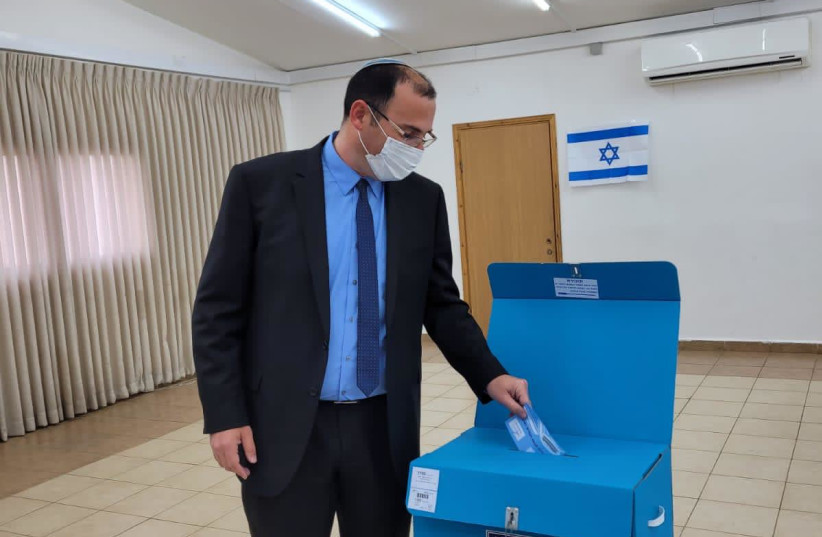Proposed judicial reforms will strengthen democracy in Israel, and harsh rhetoric in opposition is politically motivated, Religious Zionist Party MK Simcha Rothman said in an interview with The Jerusalem Post on Sunday, as he explained the next steps for the plan.
The reforms were announced by Justice Minister Yariv Levin on Wednesday, but the items had been discussed throughout the 2022 general election. Following the announcement, dramatic criticisms were leveled about the end of democracy from legal authorities and former High Court justices, coming to a head with tens of thousands protesting in Tel Aviv on Saturday night.
Rothman, one of the main architects of the judicial reforms, said the plan would increase accountability and fix a broken system. He said opposition to the reforms was based on politics rather than principle.
“When the Left is not in power, there is no democracy for them. The people should not decide,” said Rothman. “Only when they are in power is democracy fine. And these demonstrations are political demonstrations, they are not demonstrations by people who care about the justice system.”
The “end of democracy” claim is not new, Rothman said. He noted that when former prime minister Menachem Begin came into power, the Left bemoaned the death of Israeli democracy.

Israel's new government's judicial reform is part of a fair democratic process
On the contrary, Rothman sees the reform as the result of a fair democratic process. As part of the election campaign, his political camp promised judicial system reform, and people voted on it. He questioned if this campaign promise shouldn’t be carried out because those who lost the election were protesting against it.
He noted the high election turnout in Israel, lending a high degree of democratic legitimacy to the Knesset.
“This whole event is very strange, and I think there is a lot of politics in it, not a concern for democracy in Israel.”
Simcha Rothman
“This whole event is very strange, and I think there is a lot of politics in it, not concern for democracy in Israel,” said Rothman. “There’s politics here. Fine, but we know each other, don’t get excited.”
The excitement, however, reached allies, such as the United States. The US State Department said Friday, “Israel’s independent institutions are crucial to upholding the country’s thriving democracy,” without directly addressing the reforms.
Rothman said he wasn’t familiar with what the State Department said, but claimed he was agnostic on the US right to interfere with Israel’s constitutional structure.
He argued the US selection of judges was not dissimilar from what was being proposed in Israel, and some issues, such as the reasonableness clause, did not exist in US jurisprudence.
“Is the US not a democracy?” asked Rothman, explaining that no other country would tolerate the legal situation in which Israel has found itself.
One of the harshest critics of the proposed reforms, former High Court president Aharon Barak, gave interviews on Saturday in which he described the reforms as comparable to an armed revolution with tanks, and that he would be willing to stand in front of a firing squad to continue his criticism.
Rothman decried the use of such aggressive rhetoric.
“Barak used fascist and violent terminology, ‘put me in front of a firing squad, tanks,’ these are his words, not mine.”
Simcha Rothman
“Barak used fascist and violent terminology. ‘Put me in front of a firing squad, tanks.’ These are his words, not mine,” Rothman said. “Nobody talks this way, they don’t understand what democracy is.”
Rothman noted that Barak’s own constitutional revolution in the 1990s was conducted “with zero public discussion. He decided that the court could suddenly intervene reasonably. It didn’t reach a referendum. It didn’t reach a vote in the Knesset. He decided it in a small group with four, five other people.”
The next step for the reforms, he said, should begin with discussion in the Law Committee, the pros and cons of each proposal and how to hone them.
“There will be in-depth discussions on each topic, and then little by little they will take shape toward the legislation and its amendment,” he said.
“Some of the reforms will advance with government laws as they [are passed], others will come as private or committee bills,” said Rothman. “At the end of the day, I want to create a uniform structure and concept for this reform.
“There are issues that are very close to each other and sit in the same law, so they will probably be legislated together. There are subjects that will certainly not be in the same law,” he explained. “The Committee for the Selection of Judges is an amendment to the Basic Judiciary Law. The Reasonableness [Clause] is also an amendment to the Basic Law of the Judiciary, or the Override [Clause]. They may be together because they are all amendments to the same basic law. We will look at them as a whole. Maybe not, it also depends on the schedules of the government, of the Knesset, depends on many things. But surely here in the committee we will deal with them as a whole.”
The process, he said, will put more power in the democratic institutions, and restore public trust in the justice system, something that he said was lost.
“The justice system has gone, it doesn’t work. And, in my opinion, today, with the exception of a very, very small and loud group, there is no dispute about it. I mean, I think there is a full consensus on the Left and the Right that the current system is not working. So there are objections on the basis of this amendment or that amendment. There are of course objections on a political basis, but on the fact that the existing system does not work, no one disagrees.”
